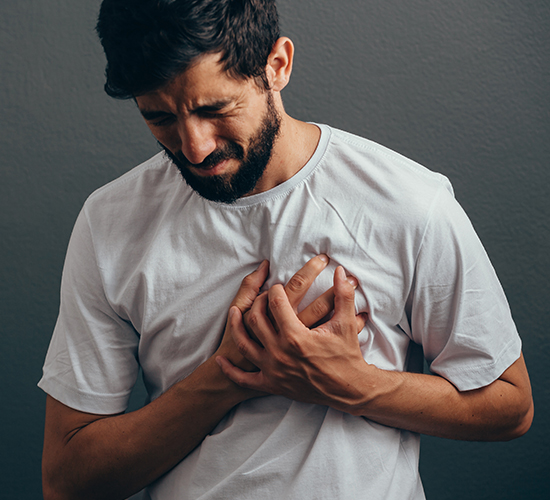Warning Signs Of A Heart Attack

A heart attack can be sudden or come more gradually. Though it may not always come with a clear warning sign, certain minor signals may show up before one gets a heart attack. Most people brush off these signs, considering them as a regular discomfort, or attributing them to the lack of sleep, overwork, indigestion or age-related pain.
A heart attack can occur when the blood flow to the heart is obstructed, which in turn damages the heart muscle. If timely treatment is not sought, the heart tissue becomes severely damaged and can even lead to death. Identifying and learning the warning signs can thus help you start the treatment early on and prevent the occurrence of a heart attack.[2]
Here are 7 warning signs of a heart attack that you shouldn’t ignore.[1],[3],[6]
1. Chest Pain [4]
Although there are varied reasons for chest pain, it is still a major sign that indicates something is not right with your heart. Usually, chest pain due to heart disease is called angina and it occurs when a heart isn’t getting enough supply of oxygen-rich blood.
The severity of the pain could vary from individual to individual – from mild discomfort to a crushing pain. Pain can be felt in your necks, arms, jaw, and upper back or under your breastbone.
2. Swelling in Lower Legs
Swelling in the ankles or feet (often called as edema) is another sign of an impending heart attack. It happens when your heart doesn’t function well, and blood circulation in your body occurs slowly. This results in the accumulation of blood in the veins of your legs, and buildup of fluids in the tissues.
3. High Cholesterol levels [7]
If a simple blood test indicates a higher level of cholesterol, especially high LDL (Low-Density Lipoprotein) levels, then it could mean your arteries are clogging with the plaque of LDL. This plaque, over time, gets accumulated in the arteries, thereby obstructing the flow of blood to the heart and lead in a heart attack.
4. Uneven Heartbeat
An uneven or fast heartbeat could also specify something is not fine with your heart. A person may feel his heart is beating faster at one time and is back to normal after a few seconds. Uneven heartbeats occur when your heart can’t pump blood properly. However, the irregular heart rate could also be a sign of Arrhythmias, which is usually harmless. But it’s always better to watch out for symptom than rather be sorry.
5. Extreme Fatigue
There could be various reasons why a person may feel fatigued. But if you feel sudden, more tired than normal, so much that you can’t do your normal activities, then it is an early sign of a heart problem.
6. High blood pressure
If high blood pressure isn’t treated, it can lead to a heart attack. High blood pressure damages the lining of arteries, increasing the risk of fat deposition, thereby obstructing the blood flow.
7. Other subtle symptoms
Certain non-specific or subtle symptoms such as indigestion, lightheadedness, flu, prolonged tiredness, numbness in legs or feet while resting, breaking out in a cold sweat and pale skin could also signify there’s a problem with the heart.
Symptoms of a heart attack may or may not be always cardiac-related. By identifying certain pertinent signs and seeking timely treatment, one can avoid the potential harmful downside.
References:
1. Early Signs of a Heart Attack. Available from https://health.clevelandclinic.org/early-signs-of-a-heart-attack/. Accessed on [06th February, 2020]
2. Heart attack symptoms. Available from https://www.heartfoundation.org.au/your-heart/heart-attack-symptoms. Accessed on [06th February, 2020]
3. The danger of “silent” heart attacks. Available from https://www.health.harvard.edu/heart-health/the-danger-of-silent-heart-attacks. Accessed on [06th February, 2020]
4. Warning signs and symptoms of heart disease. Available from https://medlineplus.gov/ency/patientinstructions/000775.htm. Accessed on [06th February, 2020]
5. 5 Warning Signs of a Heart Attack. Available from https://www.pennmedicine.org/updates/blogs/heart-and-vascular-blog/2018/august/signs-of-a-heart-attack. Accessed on [06th February, 2020]
6. High Blood Pressure (Hypertension). Available from https://www.cardiosecur.com/magazine/specialist-articles-on-the-heart/high-blood-pressure-causes-and-connection-to-heart-attacks. Accessed on [06th February, 2020]
7. Heart Disease and Lowering Cholesterol. Available from https://www.webmd.com/heart-disease/guide/heart-disease-lower-cholesterol-risk#1. Accessed on [06th February, 2020]